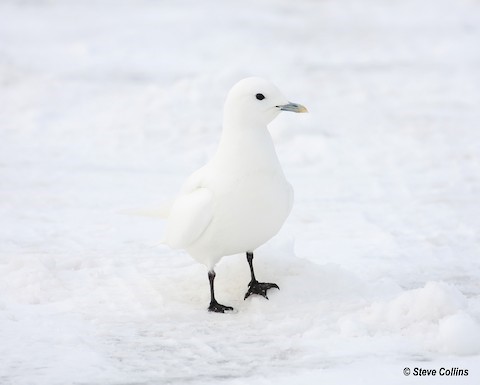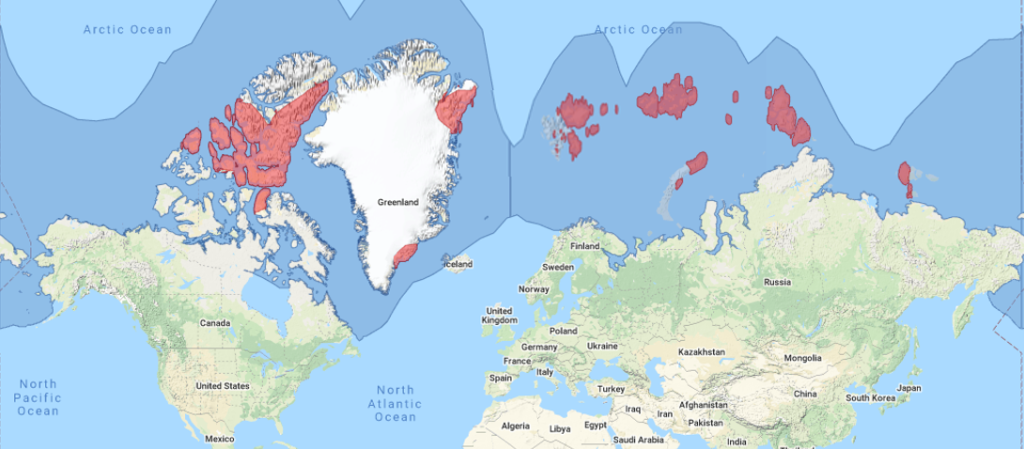Birdfinding.info ⇒ Uncommon, sporadic, and difficult to find even in most of its high arctic nesting areas. Its preference for the marginal pack-ice zone makes it difficult to pursue. The most accessible breeding areas are on Svalbard. Annual as a migrant at two accessible sites in Alaska: Gambell in late May and early June and Barrow in October. In winter, it can usually be found at a few sites in northern Newfoundland, including L’Anse-aux-Meadows and St. Anthony. Most years, a few appear on the Avalon Peninsula.
Ivory Gull
Pagophila eburnea
Breeds in the high arctic and disperses across the Arctic Ocean and adjacent seas.
Breeding. Breeds from June to August in small colonies, usually on cliff ledges or glacial gravel deposits, in the Canadian Archipelago, Greenland, Svalbard, Franz-Josef Land, Novaya Zemlya, Severnaya Zemlya, and smaller islands of the Kara Sea. Sometimes breeds on the roofs of abandoned buildings.
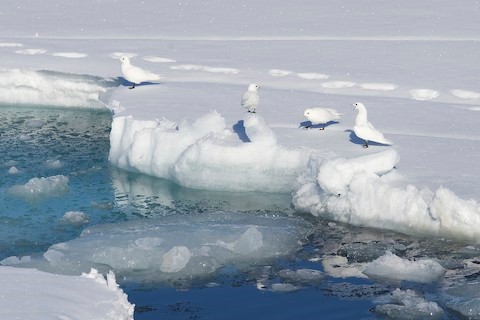
Ivory Gulls in typical habitat at the edge of the sea ice. (Longyearbyen, Svalbard; July 19, 2014.) © Marc Fasol
The various breeding populations are difficult to estimate, in part because of limitations on access and in part because colonies fluctuate widely from year to year. Roughly two-thirds of the global population breeds in Russia, with the remaining third divided among Canada, Greenland, and Svalbard.
Russian population estimates during the 2000s were 1,000-1,500 pairs on Franz-Josef Land, 1,500-3,000 on Severnaya Zemlya, and 1,000-2,500 in the rest of the Kara Sea Islands.
The Greenland population has been estimated at 900-2,000 pairs, Norway’s at 800-1,500, and Canada’s in the low hundreds, following a steep decline in the 1990s and early 2000s.
Nonbreeding. Disperses throughout the Arctic Ocean and south into the Bering, Labrador and Norwegian Seas, mostly along the edge of the pack-ice in areas with some open water and some icebergs. Regular in winter south to northern Newfoundland and Iceland.
Small numbers regularly occur south to southern Newfoundland and Nova Scotia. In most years a few vagrants appear in the interior of North America, usually around the Great Lakes, and along coasts of northwestern Europe, but occasionally much farther south.
Some of the most southerly records include: Los Angeles, California (January 5, 1996); Pismo Beach, California (November 6-7, 2010); Pickwick Dam, Tennessee (February 10-21, 1996); West Point, Georgia (January 26-29, 2010); Arcachon Bay, France (January 25 – February 20, 2009); and Nazaré, Portugal (November 17-21, 2014).
Identification
Unique: adult is an all-white, dove-like gull with a yellow-tipped greenish-gray bill and black legs and feet. The bill tip can vary from whitish to orange.
Juvenile and first-winter birds resemble adults but have variable amounts of dark-gray feathering on the face and black tips on the tail and wing-feathers.
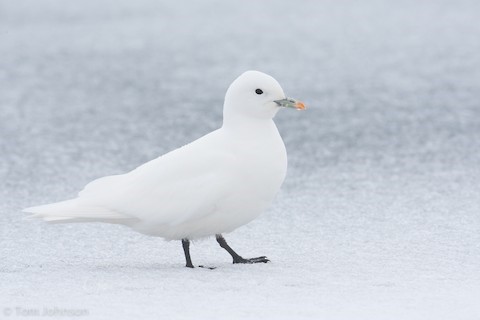
Ivory Gull. (Kings Bay Wildlife Management Area, Rouses Point, New York; February 27, 2010.) © Tom Johnson
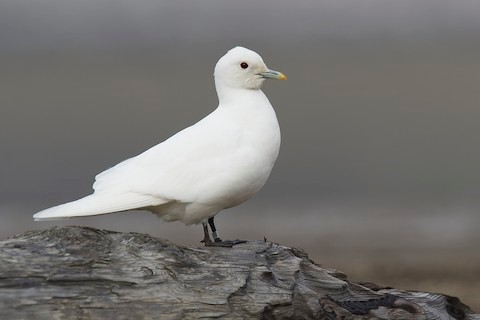
Ivory Gull. (Longyearbyen, Svalbard; July 22, 2014.) © Marc Fasol
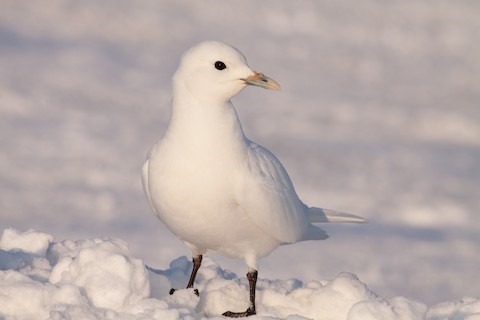
Ivory Gull. (Plymouth, Massachusetts; January 23, 2009.) © Ian Davies
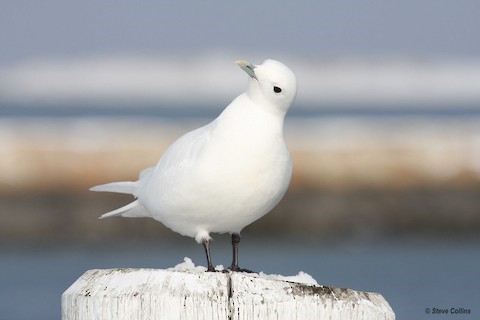
Ivory Gull. (Plymouth, Massachusetts; January 23, 2009.) © Steve Collins

Ivory Gull. (Kings Bay Wildlife Management Area, Rouses Point, New York; February 27, 2010.) © Tom Johnson

Ivory Gull. (Brepollen, Svalbard; July 1, 2016.) © Noah Strycker

Ivory Gull. (Pismo Beach, California; November 6, 2010.) © Brian Sullivan
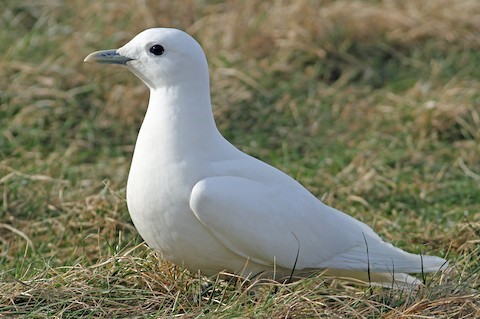
Ivory Gull. (Stevenston Point, North Ayrshire, Scotland; February 11, 2019.) © Elliot Montieth
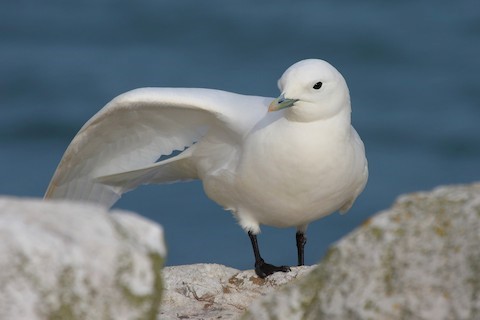
Ivory Gull. (Porto da Nazaré, Leiria, Portugal; November 18, 2014.) © António Gonçalves
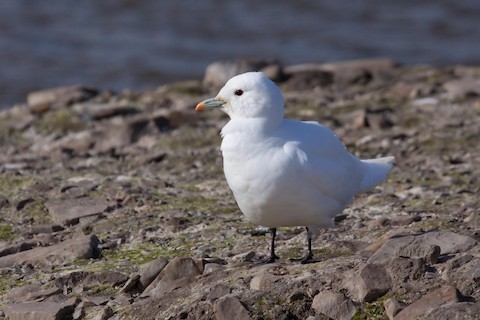
Ivory Gull. (Vestpynten, Svalbard; July 20, 2011.) © Tom Bedford
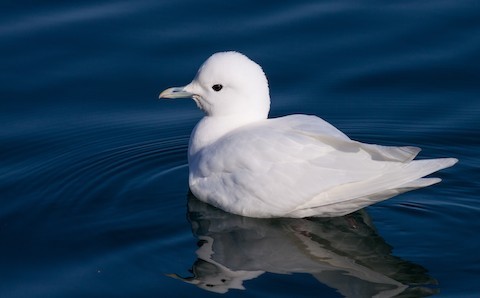
Ivory Gull. (Plymouth, Massachusetts; January 22, 2009.) © Ian Davies
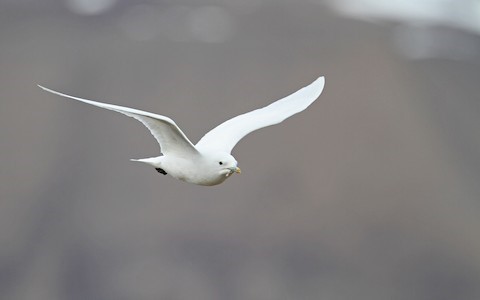
Ivory Gull. (Longyearbyen, Svalbard; June 14, 2015.) © Christoph Moning
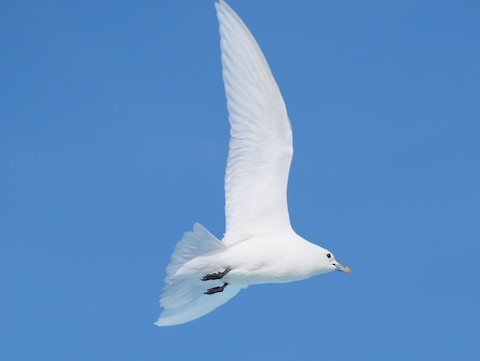
Ivory Gull. (Monacobreen, Northwest Spitsbergen National Park, Svalbard; August 4, 2019.) © Peter Lowe
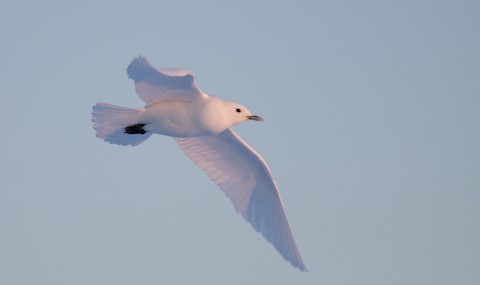
Ivory Gull. (Plymouth, Massachusetts; January 22, 2009.) © Ian Davies

Ivory Gull. (Plymouth, Massachusetts; January 22, 2009.) © Ian Davies
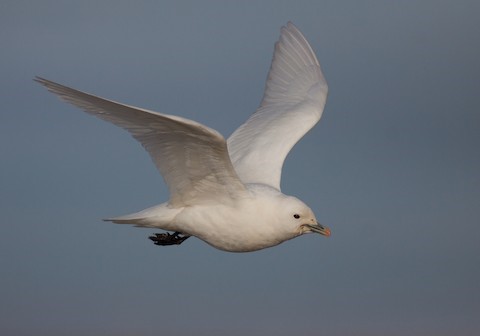
Ivory Gull. (St. Peter-Ording, Schleswig-Holstein, Germany; January 17, 2017.) © Joachim Bertrands
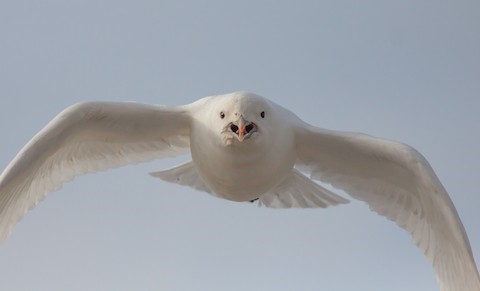
Ivory Gull. (St. Peter-Ording, Schleswig-Holstein, Germany; January 17, 2017.) © Joachim Bertrands
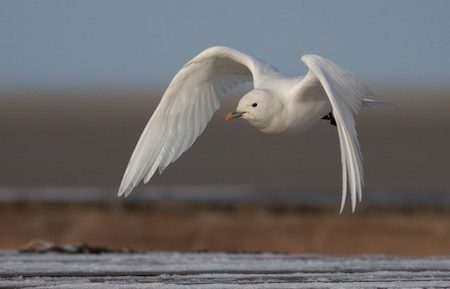
Ivory Gull. (St. Peter-Ording, Schleswig-Holstein, Germany; January 17, 2017.) © Joachim Bertrands
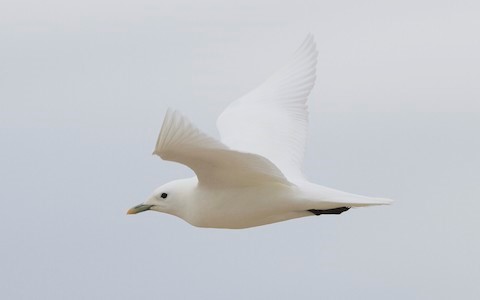
Ivory Gull. (Pismo Beach, California; November 6, 2010.) © Brian Sullivan
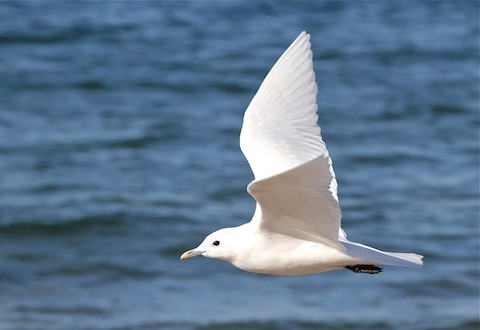
Ivory Gull. (Race Point Beach, Provincetown, Massachusetts; January 15, 2010.) © Peter Trimble
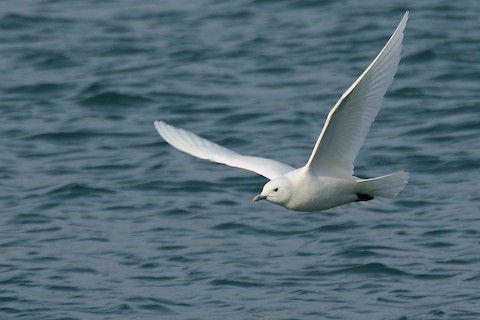
Ivory Gull. (Porto da Nazaré, Leiria, Portugal; November 18, 2014.) © António Gonçalves
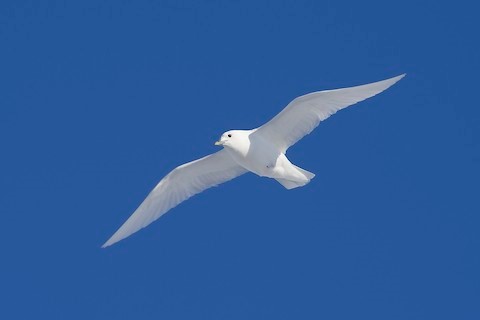
Ivory Gull. (Longyearbyen, Svalbard; July 19, 2014.) © Marc Fasol
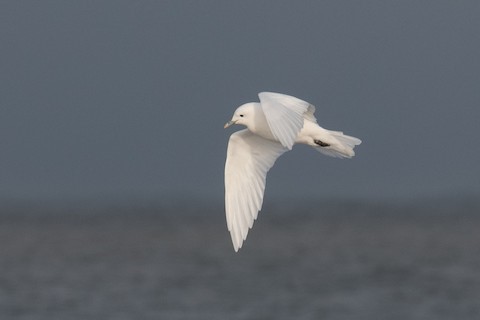
Ivory Gull. (Barrow, Alaska; October 13, 2019.) © Aaron Lang
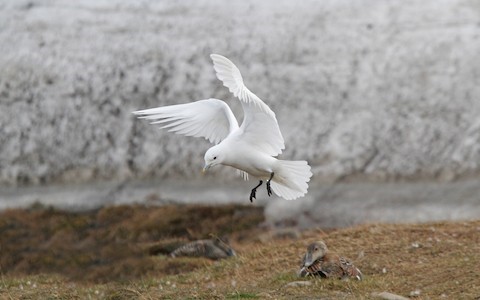
Ivory Gull. (Longyearbyen, Svalbard; June 14, 2015.) © Christoph Moning
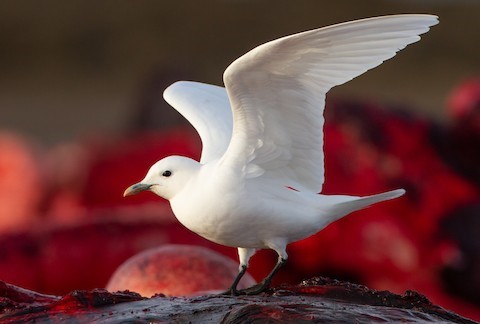
Ivory Gull. (Barrow, Alaska; October 7, 2012.) © Josh Parks
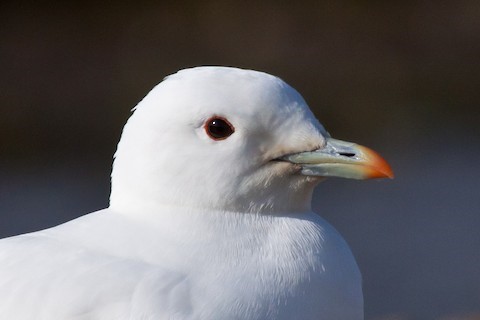
Ivory Gull, adult, close-up showing orange bill-tip. (Vestpynten, Svalbard; July 20, 2011.) © Tom Bedford

Ivory Gull, adult, close-up showing yellowish bill-tip. (Race Point Beach, Provincetown, Massachusetts; January 15, 2010.) © Peter Trimble
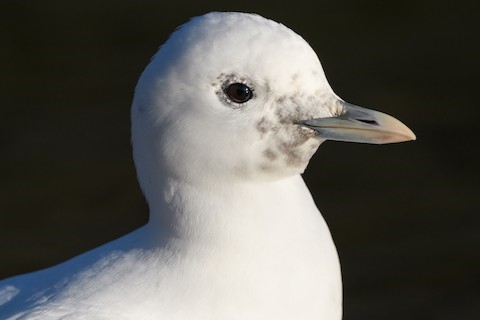
Ivory Gull, first-winter. (Blue Bay, Flathead Lake, Montana; February 2, 2020.) © Darren Clark
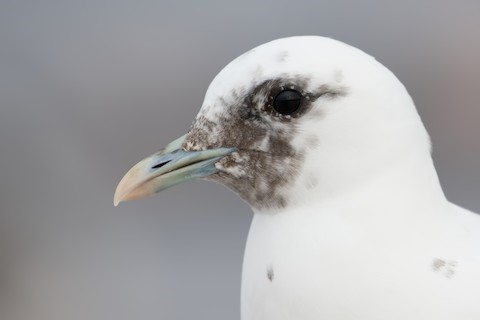
Ivory Gull, first-winter. (Canal Park, Duluth, Minnesota; January 5, 2016.) © Steve Kolbe
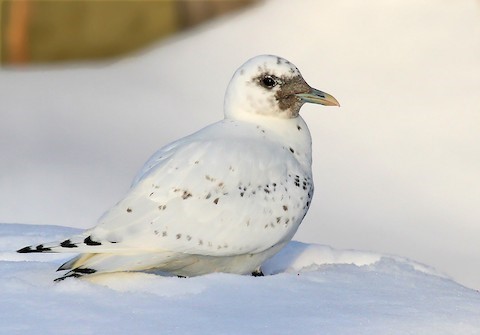
Ivory Gull, first-winter. (Red Cliff, Wisconsin; February 17, 2016.) © Ryan Brady
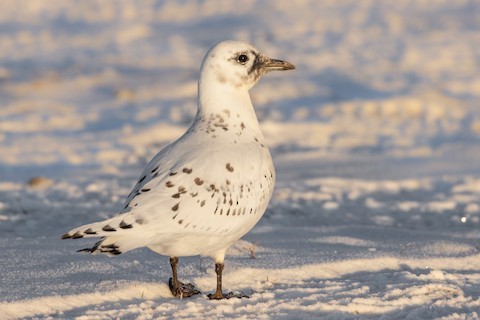
Ivory Gull, first-winter. (Húsavík, Iceland; November 23, 2020.) © Gaukur Hjartarson

Ivory Gull, first-winter. (Blue Bay, Flathead Lake, Montana; February 3, 2020.) © RJ Baltierra
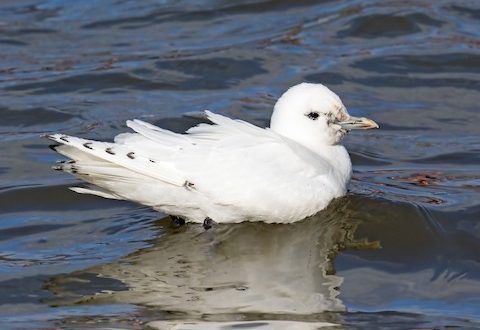
Ivory Gull, first-winter. (Flint, Michigan; March 12, 2017.) © Darlene Friedman
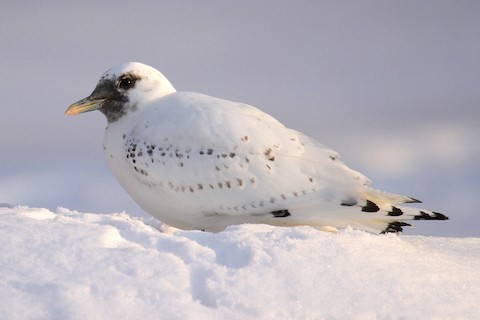
Ivory Gull, first-winter. (Red Cliff, Wisconsin; February 17, 2016.) © Nick Anich
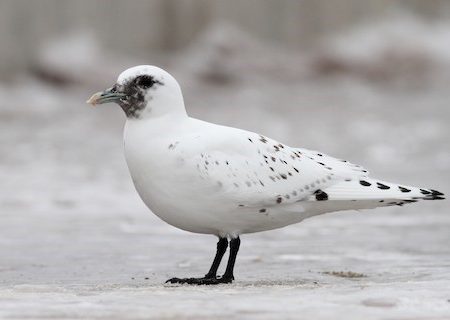
Ivory Gull, first-winter. (Canal Park, Duluth, Minnesota; January 6, 2016.) © Nathan Goldberg
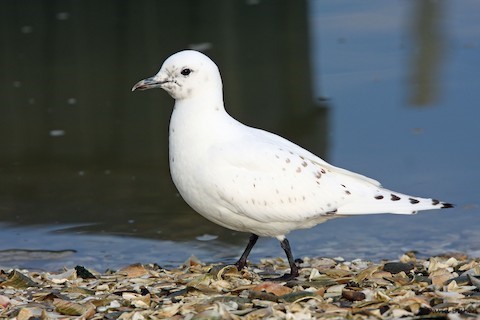
Ivory Gull, first-winter. (Cape May, New Jersey; December 7, 2009.) © David Disher
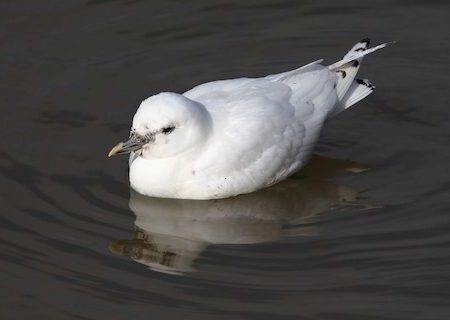
Ivory Gull, first-winter. (Flint, Michigan; March 11, 2017.) © Brendan Klick
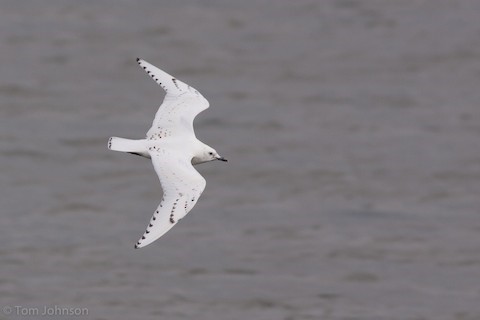
Ivory Gull, first-winter in flight, dorsal view. (Cape May, New Jersey; November 27, 2009.) © Tom Johnson
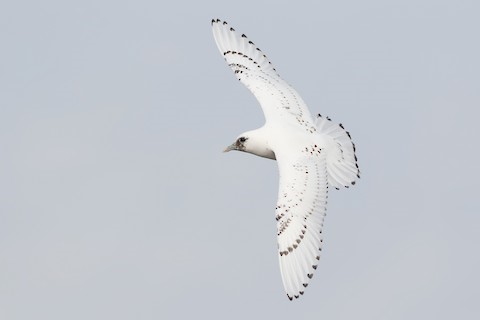
Ivory Gull, first-winter in flight, dorsal view. (Canal Park, Duluth, Minnesota; January 5, 2016.) © Steve Kolbe
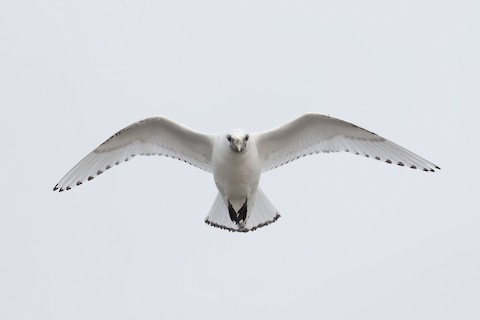
Ivory Gull, juvenile in flight, ventral view. (Canal Park, Duluth, Minnesota; January 5, 2016.) © Steve Kolbe
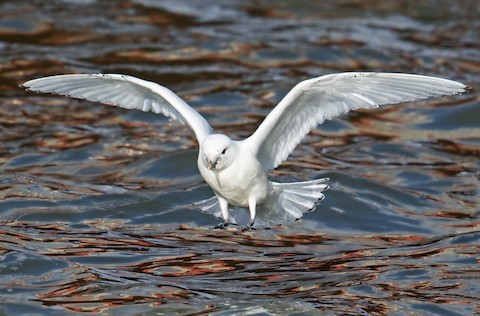
Ivory Gull, first-winter in flight. (Flint, Michigan; March 12, 2017.) © Darlene Friedman
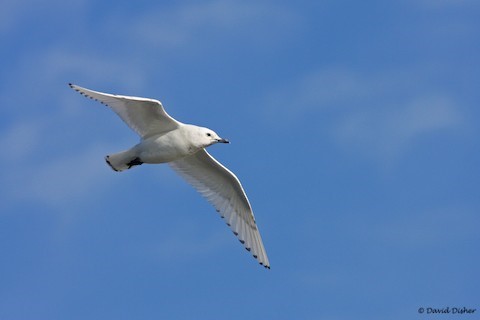
Ivory Gull, first-winter in flight, ventral view. (Flint, Michigan; March 10, 2017.) © Brendan Klick

Ivory Gull, first-winter in flight, ventral view. (Bree-Zee-Lee Marina, Cape May, New Jersey; December 7, 2009.) © David Disher
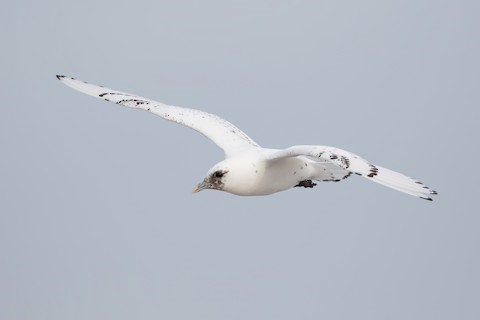
Ivory Gull, first-winter in flight. (Canal Park, Duluth, Minnesota; January 5, 2016.) © Steve Kolbe
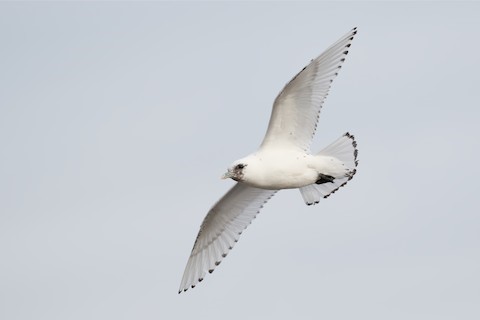
Ivory Gull, juvenile in flight, ventral view. (Canal Park, Duluth, Minnesota; January 5, 2016.) © Steve Kolbe
Notes
Monotypic species.
IUCN Red List Status: Near Threatened.
References
Alderfer, J., and J.L. Dunn. 2014. National Geographic Complete Birds of North America (Second Edition). National Geographic Society, Washington, D.C.
BirdLife International. 2018. Pagophila eburnea. The IUCN Red List of Threatened Species 2018: e.T22694473A132555020. https://dx.doi.org/10.2305/IUCN.UK.2018-2.RLTS.T22694473A132555020.en. (Accessed December 31, 2020.)
Brazil, M. 2009. Birds of East Asia. Princeton University Press.
eBird. 2020. eBird: An online database of bird distribution and abundance. Cornell Lab of Ornithology, Ithaca, N.Y. http://www.ebird.org. (Accessed December 31, 2020.)
Harrison, P. 1983. Seabirds: An Identification Guide. Houghton Mifflin, Boston.
Howell, S.N.G., and J.L. Dunn. 2007. Gulls of the Americas. Houghton Mifflin, Boston.
Johnson, S.R., and D.R. Herter. 1989. The Birds of the Beaufort Sea. BP Exploration (Alaska) Inc., Anchorage, Alaska.
Mullarney, K., L. Svensson, D. Zetterström, and P.J. Grant. 1999. Birds of Europe. Princeton University Press.
Xeno-Canto. 2020. Ivory Gull – Pagophila eburnea. https://www.xeno-canto.org/species/Pagophila-eburnea. (Accessed December 31, 2020.)
